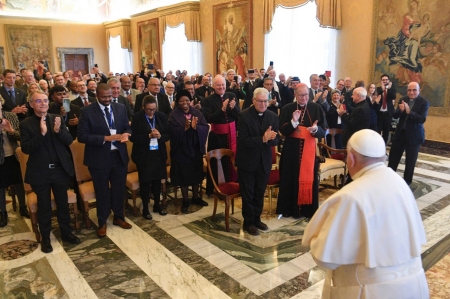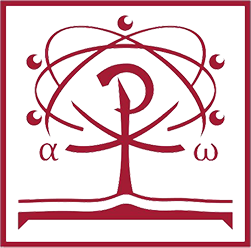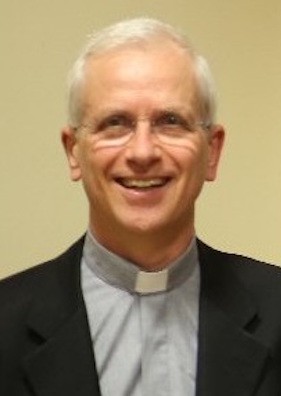Per discernere il bene possibile

L’1 agosto, il sito Katholisch.de ha pubblicato un’ampia intervista con don Maurizio Chiodi, teologo morale, Accademico della Pontificia Accademia per la Vita. L’intervista è stata realizzata da Mario Trifunovic.
Di seguito il testo integrale dell’intervista, nell’originale inglese.
Pope Francis has appointed you as a member of the group of experts on controversial pastoral and ethical issues. What do you expect from this study group?
Our Group is the ninth one and it is dedicated to reflecting on “Theological Criteria and Synodal Methodologies for a shared discernment on doctrinal, pastoral and ethical controversial issues”. We are very different in terms of competence and provenance – Italy, South America, Africa (Congo) –, men and women, but that is a great chance and it’s a very important premise to do some good work. Every one of us can bring his competence and his perspective, to share our reflection as theologians. This is the most general purpose of our group: to think theologically, to think our faith and its practical implications in this world today, a very different world compared to the past.
What exactly will your expert group be dealing with?
The mandate of Group Nine has two main focuses. The first one is to elaborate Criteria of discernment and the second one is to deal with some big doctrinal, ethical and pastoral issues in the Catholic Church today. As says the Instrumentum laboris, the issues of homosexual christians, the questions linked to Gender and Polygamy. Obviously, it would be impossible to “resolve” all these issues in a little circle of theologians and believers. We are engaged in a process with all the Church, across all the world, even though the questions are very different: polygamy is a typical african topic and the others ones are very much discussed in west countries.
So, the main mandate of our Group is to propose Criteria, that is to say a method, a style and a way to approach controversial issues and themes. Between Criteria and concrete issues, obviously, there is something like a virtuous circle. Ultimately, the link between criteria and concrete issues is very close to the connection between practices and thought, praxis and theoria, according to Greek words, in the Church, but also – more generally – in human life.
I think that in the face of these problems we cannot proceed by deriving so called “solutions” from abstract principles. We might always start from the experience, the concrete histories of the people, of course without forgetting the questions of the universal good implied in every situation. Only at the end of this process we are able to discern the concrete possible good.
What do you expect from the other study groups of the Synod on Synodality?
I am aware of the great history of the Church and I know very well that this time is a time of “crisis”, that is to say a time in which we have to think and to choose in face to new opportunities and difficulties. But I believe that every culture has its chances and its challenges to go through. The Synod on Synodality tell us that, especially in the Church, we cannot answer the challenges of this time alone, but together, in a spirit of translating today the gift of the Gospel. The ten Groups will continue their work also after the end of the Synod, because pope Francis and all of us are very aware that these challenges are some of big issues of our time.
Has Pope Francis thereby defused the Synod on Synodality?
If I understood your question, I don’t think that pope Francis wants defuse the Synod. But we cannot think that a Synod could resolve everything, like a panacea. We cannot expect that one Assembly, even though very important, could resolve all the problems … On the contrary, I believe that Synodality paves a way to join together differences and unity in the Church, in a process that will never be fulfilled.
In conservative circles, you are known as the “Italian James Martin” because of an interview you gave to the newspaper “Avvenire” in 2019, in which you said that we need to rethink our stance on homosexuality. Can you elaborate on that?
I am not engaged in a pastoral accompaniment of LGBT+ groups, I am only a theologian who deals also with these questions. First of all, I want say that it’s obviously impossible to expect to elaborate in a few lines a new – but necessary – approach to homosexuality. I think that today we have to rethink the traditional – and today incomprehensible for our time – ethical reflections on homosexuality. If we spoke in the past of homosexuality as “contra naturam”, we have to ask today: what does “natura” mean? This Latin word has a lot of meanings – very different from each other –, first of all the meaning of universality and we have to recognize that the universality is necessary for moral knowledge. But we cannot think universality (good and law) without singularity (conscience) which always belongs to a particular culture, in the meaning of cultural anthropology. Moral experience is irreducible to a reason which doesn’t have a deep debt to experience and lived life of singular conscience, with its particular culture.
So, I think that the sexual difference is constitutive of the human condition, because it’s at the origin of our life: all of us, we know that we come, as child, from a mother and a father. A homosexual person doesn’t deny that. But he/she doesn’t feel this difference as attractive for him/herself. This sexual orientation doesn’t depend on his/her decision. We have to ask: what is the possible good for a person in such a condition? The issue of a homosexual person is to live his/her sexual life, recognizing the call to relations capable of proximity, solicitude, communion and fidelity to the other, searching for the good that is concretely possible for him/her.
The declaration on blessings met with various reactions around the world: in Africa it was rejected, in Germany it was called a “blessing light”. Why was “Fiducia supplicans” important?
Fiducia supplicans has a clear purpose: on the one hand it didn’t want to change the traditional judgment on homosexuality and on the other hand the Vatican Document proposed a new pastoral approach to the request of homosexual couples asking for a blessing of their life, but distinguishing clearly this blessing from any kind of liturgical blessing and sacramental marriage. This Response of Vatican poses a further question: starting from this new pastoral attitude how can we re-formulate our theoretical approach? But this is a work of all the Church, recognizing the different tasks of lay people (sensus fidei fidelium) – also in the different local churches –, theologians and magisterium of the Church.
And how can the Church go more into dialogue on these issues with people who completely reject such topics?
I think that we have to recognize the importance of discernment. Discerning doesn’t mean accepting that there are different truths, but discerning that truth of God became flesh in the history of Christ. The truth of God implies a listener and a interlocutor. So, we have to accept seriously what historicity of christian faith means and its moral experience and the connected testimonies. The first step of discernment is to let everyone speak, hearing deeply the questions that he/she poses. Without accepting the other – which is an acceptance of otherness – a true dialogue couldn’t exist. Obviously, the process – or the virtue – of discernment goes on, reflecting together on the “good” implied in all concrete situations and positions, including the moral rules which give historical word to universal good: this is the second step. At the end, the discernment concludes with the decision about the moral good which is possible in this complex and obscure situation.
One last question: In 2019, you used Amoris Laetita in a lecture to emphasize that artificial contraception is possible under certain circumstances. The Church is known for advocating a sexual morality that quite a few people no longer find up-to-date and even ignore. Does the Catholic Church need to completely rethink and reformulate its sexual morality?
There was an Italian catholic philosopher, Pietro Prini, who, still at the end of the last century, spoke of a “submerged schism” in the catholic Church especially on sexual moral. I don’t think that we have to reject our tradition, but that we have to rethink and reformulate it, starting from the Bible, conversing with the christian people, hearing their experiences. The purpose of this difficult process, with its unavoidable tensions, is to find the good of God for our humanity, today, in this time. I think that a good example of this work, from a theological perspective, was made from a book, of which I was a co-author: Etica Teologica della vita, with a Preface of Archbishop Vincenzo Paglia – President of the Pontifical Academy for Life. The book was originally published by Libreria Editrice Vaticana (the Publishing House of the Vatican) in Italian and then in Spanish and French; soon will be in English. Together with others theologians, we made the effort to propose a new style – or a “change of model” – to think ethically and theologically today, both in Bioethics and in some theme of sexual morality.
/end




